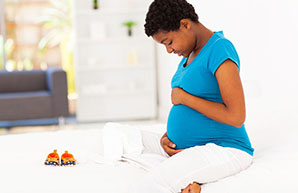Left untreated, depression or anxiety during pregnancy can have serious health implications for the birther and the developing baby. Possible effects of mental illness during pregnancy include poor eating habits, smoking, drinking, suicidal behaviour, premature labour and low birth weight.
What to do if you're suffering from depression
We all have days when we feel low, but if you feel depressed for most of the day for weeks on end, then it is likely that you need help with managing perinatal depression (depression during pregnancy). Symptoms of depression include fatigue, restlessness, feelings of guilt or worthlessness, sleep difficulties and suicidal thoughts. However, it is important to remember that two of the main symptoms of depression, that is, trouble sleeping and fatigue, are also synonymous with pregnancy, so these may not necessarily indicate that depression is evident.
“Once a diagnosis of depression is made, specific interventions are often needed to combat the debilitating symptoms of the illness. Because every woman has unique characteristics and circumstances, treatment varies to address individual needs,” says Dr Elsa du Toit, a psychiatrist with a special interest in maternal health. Many forms of counselling and therapy are available, and your doctor should be able to advise you on suitable options for your circumstances.
“However, some women will also need medication to gain back their health. Literature makes it clear that untreated depression is harmful for mothers and for the development of their babies. Sometimes the negative impact of depression far outweighs the risks of medication usage during pregnancy,” adds Dr du Toit.
A personalised, patient-specific mental health care plan that considers the mother’s illness, previous use of medication and the safety of the baby is advised.
What to do if you're suffering from anxiety
Anxiety affects many people during pregnancy. Some of the most common worries that pregnant people experience include whether they will be a good enough parent, the fear of childbirth, worries about how it will affect their relationships, and concerns about the financial implications of potentially losing one source of income.
All pregnant people worry some of the time (growing a life inside you is a huge responsibility!), but if your worries become so severe that you can’t function normally, then you need help. Start by confiding in your partner or in other moms that you trust. Just talking about your feelings can often help to put them in perspective.
If that doesn’t help, consider seeking professional counselling. Your doctor or gynaecologist should be able to refer you to someone who can help you.
What can I do to look after my mental health during pregnancy?
Your mental health is strongly connected to your physical and emotional health, so a few simple lifestyle changes may help to keep you sane during pregnancy:
- Get some exercise – aim to walk briskly for half an hour at least every second day.
- Eat a healthy, balanced diet. Your developing baby takes what they need from you, so if your diet is deficient, you’re going to suffer. This includes taking antenatal supplements. Look for one that contains omega-3 fatty acids, which help to maintain mental health. Try Clicks Pregnancy Supplement with Omega-3, Calcium and Magnesium or Vitabiotics Pregnacare plus Omega-3 (dual pack).
- Ask friends or family for help with household chores or errands.
- Get enough sleep. It may sound easier said than done, but try to rest whenever you can.
Where to go for help
For a support group close to you, call the South African Depression and Anxiety Group (SADAG) on 011-262-6396 or visit their website. Alternatively, speak to your GP for guidance.
IMAGE CREDIT: 123rf.com

